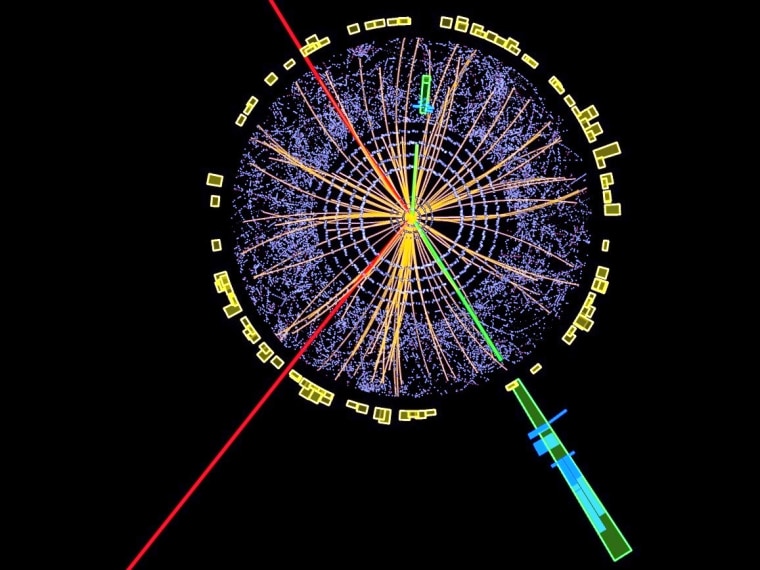The discovery of the Higgs boson is the odds-on favorite for the Nobel Prize treatment next week — so much so that one spoof suggested the prize committee should just give it to the subatomic particle and be done with it. But even if the physics prize hails the Higgs as expected, there could still be plenty of drama over the decision.
Who'll receive the prize on Tuesday? That gets complicated: Traditionally, the scientific Nobels go to no more than three living individuals. Two theorists have been mentioned as the top names for Higgs honors: Peter Higgs, the Scottish physicist after whom the particle is named; and Belgium's Francois Englert, who also postulated the particle's existence back in 1964.
But three other researchers played a part in laying down the theoretical framework for the boson's role — Gerald Guralnik, Carl Hagen and Tom Kibble. Thousands of physicists were involved in the experiments that nailed down the evidence for the Higgs boson (or at least "a" Higgs boson) over the past couple of years. Shouldn't they get some share of the credit as well?
"It's a nightmare of a choice, which is the way things go," Thomson Reuters' David Pendlebury, who issues annual lists of Nobel-worthy scientists, told NBC News on Friday. "In many people's minds, it's not fair that the others are left out, but such are the rules of the Nobel Prize."
Large-group laureates?
There are ways to get around those rules. The Nobel Peace Prize, for example, has been awarded several times to organizations such as the European Union rather than to individuals. That's never happened with the scientific Nobels, but some prize-watchers suggest this is the right year to set a new precedent.
One option is to give the prize to Englert, Higgs and Europe's CERN physics lab. After all, CERN's Large Hadron Collider is where the evidence for the Higgs was finally found. Another option, favored by Columbia mathematician Peter Woit, would be for the Nobel committee members to recognize CERN and the collaborations for the LHC's two big experiments, CMS and ATLAS.
"I very much doubt that they're going to break with their tradition and award a prize to an institution," Pendlebury said. He noted that there are plenty of cases in the 112-year history of the prizes where someone deserving was left off the list. For example, in a perfect world, Oxford University's Norman Heatley would have been the fourth man on the list for the Nobel Prize for physiology and medicine in 1945, which was awarded for the discovery of penicillin.
"He was not perturbed by this at all," Pendlebury said of Heatley. "He was a model of grace."
Teachable moment
Regardless of who gets the Nobel, a prize that focuses on the discovery of the new subatomic particle would also focus fresh attention on the Higgs boson, which is a tough topic for people to wrap their heads around. Even Pendlebury admits that the details of the Higgs mechanism, and how it plays a role in endowing other subatomic particles with mass, are hard for him to explain. Nevertheless, he appreciates the significance of a scientific quest lasting nearly 50 years.
"Let's take it as given the importance of this discovery as it relates to our understanding of the Standard Model of physics," he said. "This discovery forms a kind of capstone to all this work."
Nobel recognition could provide a teachable moment for particle physics at just the right time, roughly halfway between the LHC's shutdown for upgrades and its scheduled restart in 2015. If the Higgs boson returns to the spotlight — or even if it doesn't — you can expect deep thoughts from the usual suspects on the Web. Here's a list of potential commentators, plus additional links to check out while you're waiting for the physics prize to be announced on Tuesday:
- Watch Nobel Prize webcasts via YouTube: Medicine/physiology prize at 5:30 a.m. ET Monday; physics prize at 5:45 a.m. ET Tuesday; chemistry prize at 5:45 a.m. ET Wednesday; peace prize at 5 a.m. ET Oct. 11; economics prize at 7 a.m. ET Oct. 14. All times are approximate.
- USLHC, online home base for U.S. researchers at the LHC
- A Quantum Diaries Survivor, by Tommaso Dorigo at CERN
- Of Particular Significance, by Rutgers physicist Mark Strassler
- Preposterous Universe, by Caltech physicist Sean Carroll
- Resonaances, by Adam Falkowski at CERN
- Google Street Views of CERN and the Large Hadron Collider
- Particle Fever, a documentary about the LHC and its scientists
- 'Big Bang Machine,' NBC News' special report on the LHC
- NBC News archive on the quest for the Higgs boson
- Inside Science coverage of the Nobel scientific prizes
- Countdown to the Chemistry Nobel: C&EN Google+ Hangout
Alan Boyle is NBCNews.com's science editor. Connect with the Cosmic Log community by "liking" the NBC News Science Facebook page, following @b0yle on Twitter and adding +Alan Boyle to your Google+ circles. To keep up with NBCNews.com's stories about science and space, sign up for the Tech & Science newsletter, delivered to your email in-box every weekday. You can also check out "The Case for Pluto," my book about the controversial dwarf planet and the search for new worlds.
